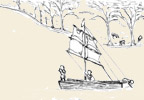
Summer 2006

 |
|
 |
| Home | Index | Museums | Blog | Authors | Site Map | About |
|
About this IssueNote from the EditorsThis Summer issue of The Crooked Lake Review begins with three of David Minor's WXXI-FM broadcast scripts telling the story of the Colquhoun clan. The story begins in the 13th century with Scottish lowlanders west of Glasgow around Dumbarton. Through the centuries they often fought with the Macgregor highlanders. In the second script, David introduces Patrick Colquhoun, born in 1745, who as a second son was sent off, when he was sixteen, to seek his fortune in Virginia. Patrick had a business sense and progressed; he had a political sense, too, and returned to England just before the colonists revolted. The third script describes Patrick's growing business activities in Glasgow. Patrick Colquhoun later became an associate of William Pulteney in land purchases in New York. John Sheret presents another story from his Mendon—The Early Years series; this time about Rochester Junction and the Lehigh Valley Railroad in their great days and later decline. John includes many photographs of the LVRR stations in: Rochester Junction, Rochester, Honeoye Falls, Mendon and Lima, of the local businesses associated with the railroad, even the baseball team. The Sherets' neighbor, Hazel Farrell Webster, whose father had been an "engineman" on the LVRR, gave John a trunk full of her father's railroad items that provided background for this article. John has an extensive collection of LVRR material and has organized museum exhibits. Richard Palmer contributes three items to this issue. The first is a description of the large model railroad layout of Guil Mack near Phelps, New York. The system has 5700 feet of track equivalent to more than 80 miles of railroad. Railroad enthusiast friends assemble at his house for "Lehigh Valley Night" when they run model trains. Mack has nearly 500 locomotives and 1000 cars. He has been producing model steam and diesel locomotives since 1979 and markets them through his company, Tiger Valley Trains. Richard Palmer also reviews the Pageant of Steam held near Canandaigua, and the Sodus Point Lighthouse. Donovan Shilling relates the story of the Rochester salesman Stanley Fox's fateful voyage on the Titanic after his successful sales campaign in Britain for the Gleason Works. Because Mr. Fox had cautiously kept his order book on his person it was recovered. Don also reports on two tours by New Society of the Genesee members, the July 22, 2006, tour on the Miss Buffalo II of Buffalo's harbor, the Colonel Ward pumping station and the abandoned New York Central rail terminal now being partially restored by a private group, and the September 9, 2006, NSoG meeting at the Curtiss Museum in Hammondsport. In his essay Grandma's Barn, Thomas Cornell recalls his keen interest, from the time he was a little boy, in all the old furniture, family pictures, letters stored in his Grandmother Marie Cornell's barn behind her house in Campbell, New York. Later when his grandmother was unable to go to the barn with him, he took photographs of items in the barn to show her and hear her stories and explanations. Marie Beard Cornell was very active in the DAR and a long-time member of the Steuben County Historical Society. She wrote the introduction to the Society's reprint of the 1893 Centennial Celebration in Bath. She was an early contributor to The Crooked Lake Review. Beth Flory's Glancing Backward columns from the Naples Record for the months of July, August and September of 1906 and 1956 appear in this issue. The summer months of 1906 were filled with family and Civil War veterans reunions, fishing expeditions, and the Great Naples Fair which in August 1906 featured balloon ascensions. During September in 1956 Robert Moody's play Hiawatha was performed on an earthen stage in the sycamore grove near West River. The same month, 175 grape growers on tour met at Widmer's vineyard in Naples. John M. Robortella supplies excerpts from his new book Frogleg George: The Legend No One Really Knew with stories of peddler John Preissecker who caught and delivered many thousands of frogs to Rochester hotels and restaurants from around 1890 until the 1920s. He became very well known as "Frogleg George" through the attention of newspapermen. The book, published by the Gates Historical Society, is available for $11.95 at the Society's Hinchey Homestead, 634 Hinchey Road, Rochester, NY, 14624, and at the Ontario County Historical Society, 55 North Main Street, Canandaigua, NY, 14424. Grace Fox's Tilted Saucer of Delight continues with her detailed descriptions of how women washed and ironed clothing and linens from the times of our grandmothers until automatic clothes washing machines became available along with fabrics that didn't require pressing. Before, it was a weekly chore that began with heating water on a cookstove, paring soap into the washwater, rubbing soiled clothes on a washboard or agitating them in a tub, then squeezing them through a wringer, rinsing, wringing again and either hanging out on a clothesline to dry or starching in preparation for ironing. Grace Fox has written what housewives and their daughters did to keep their family members clean and presentable. Timothy Meigs Younglove's diary for the summer months of 1842 continues with the farm work of building and repairing livestock fencing, hoeing, haying, plowing, planting and with Timothy's other activities: surveying property lines, appearing at trials, attending lectures and observing the Sabbath. T. M. Younglove's great-great-grandson Paul Woods transcribed the diary onto a CD and has generously provided it for use here. CLR Blog | Site Map | Contact CLR |